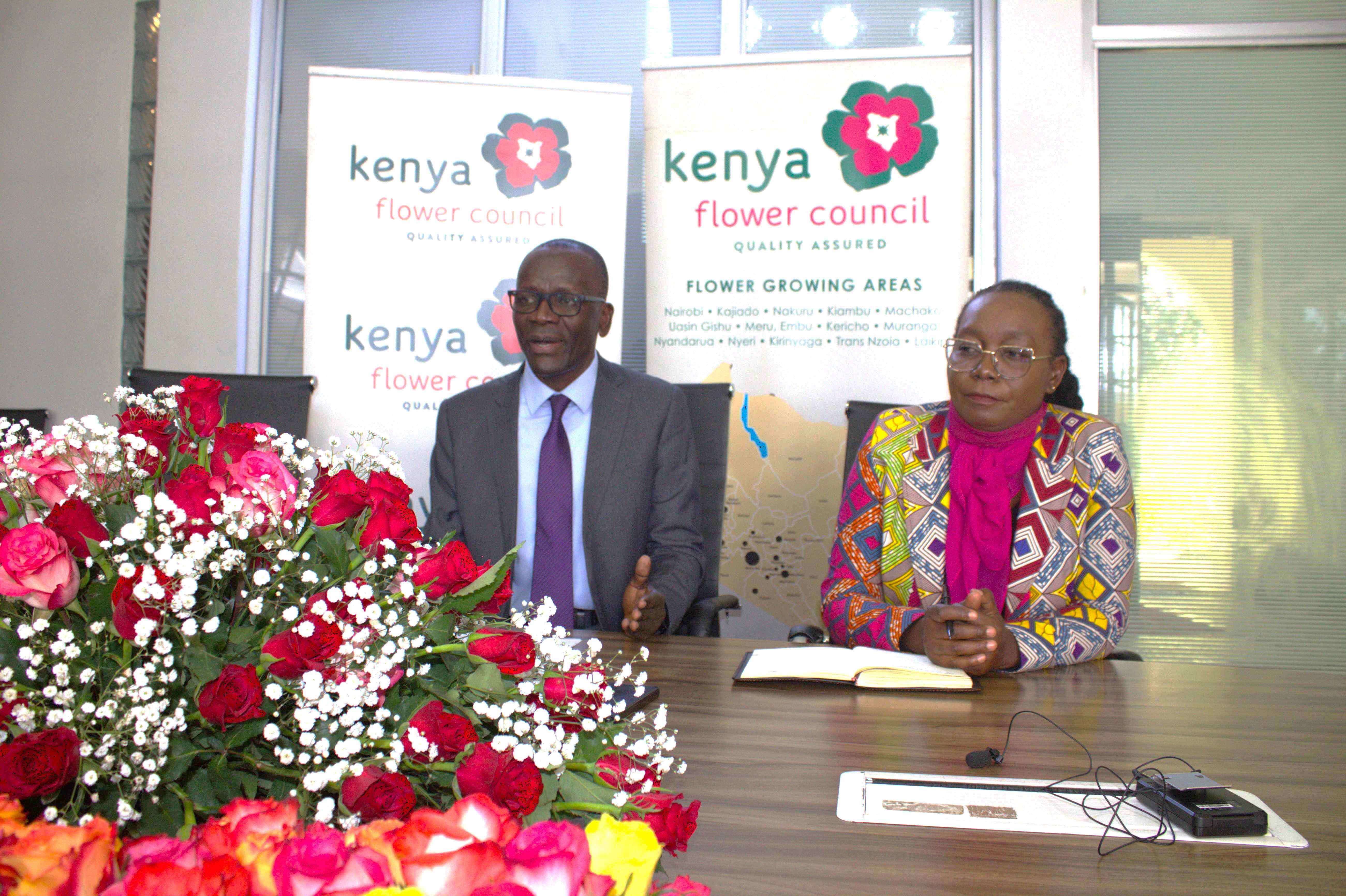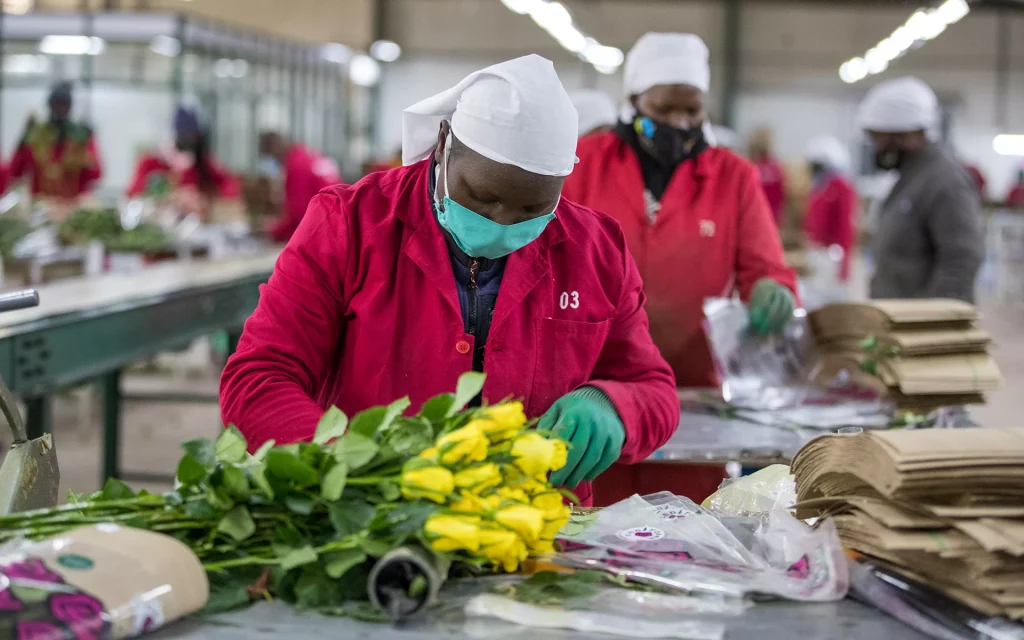by Victor Okeyo

Kenya’s flower industry is one of the most vibrant economic sectors in the country, generating approximately Kshs. 110 billion annually, contributing 1.6% to the GDP.
The industry also employs over 200,000 workers directly.
However, despite being the world’s third-largest producer of cut flowers, and dominating global markets, particularly Europe, the sector faces critical challenges that threaten its growth and sustainability.
As Clement Tulezi, CEO of the Kenya Flower Council, noted, “Floriculture is a key driver of Kenya’s economy, feeding families, fueling exports, and generating employment. However, high operational costs and policy challenges are slowing down our growth potential.”
Key Challenges
- Taxation Burden and Investment Uncertainty
Currently, exporters pay 55 different levies and taxes annually, which has significantly reduced profit margins. The heavy tax regime is imposed by both national and County governments.

In contrast, other countries like Ethiopia have implemented more favorable tax policies to attract investment in its floriculture sector. The Ethiopian government offers a five-year tax holiday for new investments in horticulture, including floriculture. Additionally, there is an exemption from import duties and other taxes on capital goods, construction materials, and spare parts valued up to 15% of the capital goods’ total value. These incentives have positioned Ethiopia as a competitive player in the global flower market, contributing to its rapid growth in the sector. For instance:
- In May 2024, KENTRADE introduced the Unique Consignment Reference (UCR) tax, which charges USD 10 per consignment. A single company paid Kshs. 14 million in UCR fees between June and December 2024 alone.
- Additional charges from KEPHIS, the Kenya Airports Authority (KAA), and the Kenya Ports Authority (KPA) have increased by 25%.
- The non-refund of VAT and double taxation continue to erode industry profitability.
These unpredictable levies have made Kenya less attractive to investors, causing some to shy away from further investments in the sector. If left unchecked, these fiscal policies could weaken Kenya’s competitiveness on the global stage. Mr. Tulezi further says the high costs and multiple levies are making it difficult to remain competitive.
2. Declining Wages and Workforce Challenges
Despite being a major employer, workers’ wages in the floriculture industry have been shrinking due to increasing government deductions, which seems to have upset wages across the economy.
The introduction of the Social Health Insurance Fund (SHIF), the Housing Levy, and changes to NSSF deductions have significantly reduced take-home pay for employees.
Due to these deductions, less than 30% of workers can meet their daily needs.

Additionally, some companies are shifting from permanent to seasonal employment to manage costs, affecting job security. The Kenya Flower Council (KFC) has been working to ensure that companies maintain stable employment structures, but high operational costs continue to put pressure on employers. Tulezi further emphasizes, “The take-home income has become so thin under the weight of taxes. Employers want to offer better wages, but the high cost of doing business limits their ability.”
Opportunities and Potential Solutions
Despite these challenges, the sector is resilient and has significant growth potential. Moreover, industry leaders are advocating for reforms that could enhance competitiveness and attract more investments. Among them:
1. Tax Reforms to Encourage Growth
The Kenya Flower Council (KFC) has urged the government to review and streamline taxation policies to alleviate the financial strain on exporters. To support long-term industry growth, KFC has engaged government bodies to advocate for tax incentives and reductions. Proposed policies include tax holidays for exporters and a reduction in the number of levies imposed on flower growers.
KFC CEO Clement Tulezi says, “We categorically oppose the arbitrary taxes and levies. These should be funded directly from KRA revenue instead of burdening exporters further.”
2. Strengthening Public-Private Partnerships
Collaboration between exporters, the government, and international stakeholders is crucial for ensuring the sustainability of the industry. The Kenya Flower Council (KFC) has been actively working with international trade organizations to lobby for fairer taxation policies and improve market access. Additionally, the government must play a proactive role in supporting exporters by fostering a favorable business environment that promotes growth and competitiveness.
3. Improving Labor Conditions and Wage Policies
Strengthening Collective Bargaining Agreements (CBAs) between trade unions and employers is essential to ensuring fair wages for workers. Additionally, encouraging productivity-based incentives can help employees cope with the rising cost of living. Reviewing government policies on deductions is also crucial to ensuring that workers retain a fair portion of their earnings.
As Clement Tulezi, CEO of the Kenya Flower Council, put it, “Kenya’s floriculture industry has the potential to flourish beyond expectations if the right policies are in place. We need a taxation system that encourages growth, not stifles it, and a regulatory framework that attracts rather than repels investment.”
